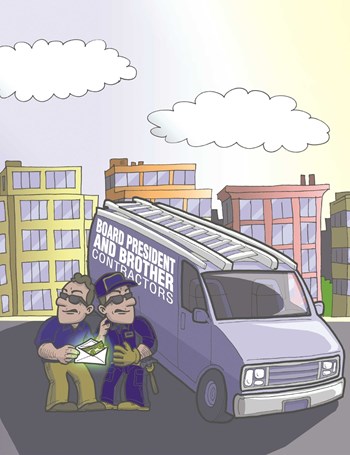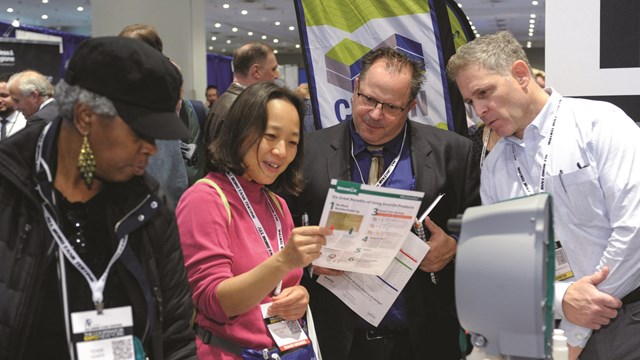
For any homeowner or tenant, the worst feeling is vulnerability. Association dues are paid, in part, to provide a sense of safety and security. High fences, security guards and gates, along with cameras and key codes help to achieve a certain level of protection. Criminals, however, are continually on the hunt looking for weaknesses and once identified, they will exploit your property’s vulnerabilities.
According to Neighborhood Scout, last year in the United States there were 2,222,196 burglaries and 6,588,873 thefts. In Chicago, a city with a population just under three million, there were 165,248 crimes committed. Included in these statistics were 131,053 property crimes and 34,195 violent crimes. A resident in the Windy City has a 1 in 84 chance of becoming a victim of a crime, and statewide, that percentage decreases to 1 in 189. As a result, managers and boards must continually assess their level of security.
“For a high rise or multiple unit property, before any judgments or decisions can be made, a crime risk assessment has to be completed. Otherwise you are just guessing,” says Chris McGoey, an author and crime prevention specialist. With 38 years of education, training, and experience in crime prevention and security management, he operates the popular website, Crime Doctor.
“You need a professional who can analyze all the police calls for a particular building or property for a period of two to five years depending on availability and cost of data,” says McGoey. “Next look at the incident reports, particularly the violent incident reports. With this information you can determine whether it is a property crime problem or violent crime problem.”
Crime reports for condominiums and co-ops run the gamut from peeping toms to parking lot theft to embezzlement, and in more serious but infrequent cases, rape and murder. Often boards and residents only become overly concerned about safety after a crime has been committed, not always before.
“Crime and crime prevention is not something people think a whole lot about and don’t plan effectively for, especially in a condominium,” says Paul Houillon of Chicago-based Connected Property Management. “A member of a condominium association doesn’t think about security as much as [a traditional] homeowner because they think everything is taken care of and that they just have to live in their unit. And if something does happen, say a crime occurs, they look to have the issue fixed and then they often go back to their life and forget about it.”
Crime by Association
As logic dictates, the location of the building or property determines the possible threat of crime. In Chicago, like every city, there are “bad” neighborhoods and “good” neighborhoods, but there are also many neighborhoods in-between. While crime may happen more often in what is considered a bad neighborhood, crimes are reported in all neighborhoods. Buildings that have renters, though, are more likely to experience instances of crime.
“The first step for managers in controlling crime is improved screening of tenants such as checking to see if the tenant has a criminal record, how recent it was and what it is for. They can also ask previous landlords for references,” says John Bartlett, the executive director of the Metropolitan Tenants Organization in Chicago. “Tenants can be on the watch and work with the owner, other tenants and community block clubs to identify criminal activity. Tenants should be screening landlords and buildings by viewing the buildings in the evening and seeing if this is actually a place they want to live.”
Joel Garson of Hillcrest Property Management in Lombard has 42 years experience in the industry. During his tenure, he has dealt with all types of crime. Currently, he manages properties with as little as five units to buildings with over 1,200 units. “The problem most of the time is that managers are not always on site so we rely on homeowners to provide us with information about suspicious activity. But homeowners are reluctant to give out information because they are afraid of repercussions.”
As a result, Garson says residents prefer to rely on security cameras or security personnel to look for crime. “This year I would say the greater Chicago crime rates are down, which is a good thing,” says Garson. “There are less violent crimes now. We see more theft—people stealing things.” In years past, he says, parking lot crime was high with car air bags being stolen on a regular basis. “These days, we are seeing less crime in the parking lot and that has to do with people taking a little more responsibility but there is room for improvement.”
To help educate residents with the hope of deterring crime, Garson said he and his team schedule annual meetings with the local police department so residents can learn about ways to identify suspicious activity. “You know, we set up these meetings but no one ever shows up, which is a problem.”
Apathy can lead to serious trouble which makes it all the more important to develop a relationship with the local police department, explains Pam Lytle, senior community association manager at Vanguard Community Management. “It’s paramount to work with the local police, taking their lead and ensuring they have your full cooperation in order to keep all residents safe. We had a murder incident that only the police had been made aware of. Per instructions from the police, we changed the locks on the unit, knowing that the resident would eventually have to contact management to get a key,” she says. “When the resident contacted management about the key, we notified the police.”
McGoey has experienced similar violent crimes over the course of his career but also finds that some criminals are dumb to the point of humor. “There is the case of the burglar who tried to climb a fence, got caught on his pants and was stuck for hours until he was rescued and arrested,” says McGoey with a laugh. “Another time, a burglar successfully entered a building with a mask. Once he entered the residence and thought he was safe, he took the mask off not knowing a security camera was directly on his face. They got a perfect shot of him and he was arrested.”
Ensuring Vigilance
With proper security precautions in place, many crimes can be deterred. These measures include up-to-date cameras and software, changing locks on a semi-regular basis and proper lighting. “We suggest associations use a security-type key that can’t be easily duplicated and those properties that do not want to spend extra money on this, we suggest changing the entry tumbler lock every few years so everyone has new keys,” says Garson. Houillon adds that these more expensive locks cost roughly $250 each with each key costing $10 to produce. “It’s not a big investment but it makes a big difference,” he says.
In the end, these security responsibilities fall to the association board which must properly instruct the management company or security vendor on best practices. However, this collective initiative is comprised of respective unit owners and renters requiring a unified approach.
“Lighting in common areas is imperative to detracting criminal behavior, locking doors, staying aware and cognizant of any recent concerns in your area. Visiting your local police department website is a great resource, too,” says Lytle. “On most websites you will find tips that will assist you in becoming less vulnerable to criminal activity.”
When a “bad element” or suspicious activity is occurring on the property or in a building, a gray area exists for most residents as they usually are unwilling to notify management or the proper authorities. Conversely, if a resident feels supported by management, they are usually more inclined to speak out. “Residents need to see the manager taking action or they will not take the risk of reporting,” says Bartlett. “There is some degree of risk involved in all this which is why it is important to involve other people.”
Never personally intervene, Lytle adds. “Contact the police department, as residents, board members and managers should never become involved in criminal activity or try to thwart the same. The best course of action is to document what you’ve seen or heard and pass your information along to the authorities,” she continues. “We do not recommend that you become engaged or approach the situation, again the best course of action is to call your local police department.”
Law enforcement officials, property managers and security professionals agree that the best way to stop crime is to prevent it. “Experienced property managers agree that a property with a truly integrated security plan will retain a higher percentage of good residents. Your best residents will move out of a property where crime and disturbances are tolerated by management,” says McGoey. “On high-crime properties, I always find a higher percentage of marginal residents living with constant fear of crime and that contributes to the downward cycle of property deterioration,” he says adding, “The best thing for a tenant to do to prevent crimes is that when they see something suspicious, they should say something. It’s that simple. ”
W.B. King is a freelance writer and a frequent contributor to The Chicagoland Cooperator.




Leave a Comment